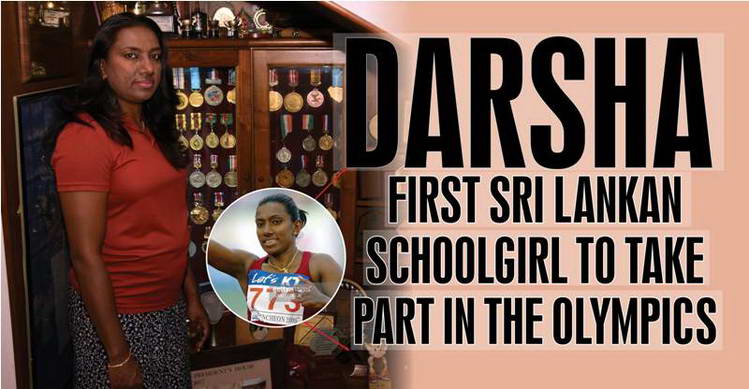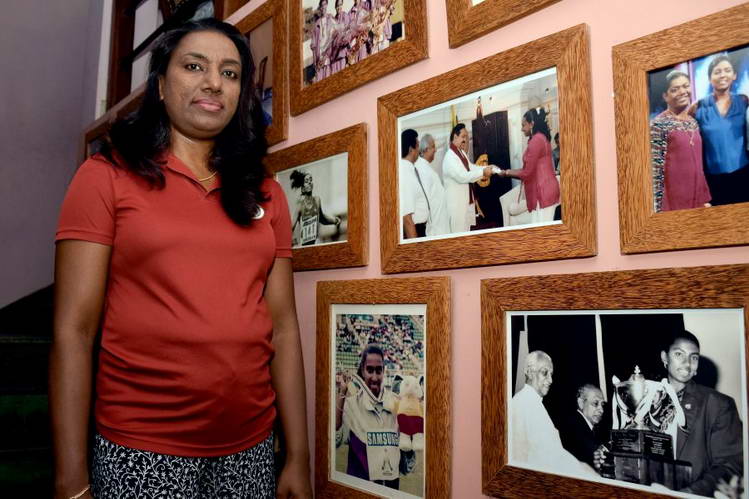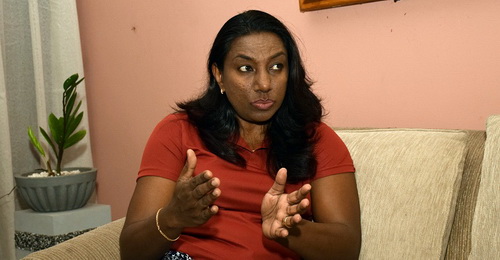DARSHA: First Sri Lankan schoolgirl to take part in the Olympics
What is learned on the athletic field is not forgotten, nor are the lessons of character that are forged there ever lost.
Born on 13 February 1975, Damayanthi Darsha is a famous name in the Sri Lankan athletic field. A proud product of Panadura Balika Vidyalaya and Ladies College, Darsha goes into history as the first schoolgirl to take part in the Olympics, when she represented the island nation in the 1992 Barcelona Olympic Games at the tender age of 17. Her main events were the 100m and the 200m races. She qualified for the quarter-final of the 200m event; an amazing accomplishment indeed for a 17-year-old!
She was born with the talent, but had a lucky break when she met the legendary coach Sunil Gunawardena, who once happened to witness this 14-year-old girl running and convinced her to choose him as her coach.
At national level she was the undisputed champion, and emerged a winner in almost all the international events she participated – from South Asian Championships to Asian Games. She was selected for the 2000 Sydney Olympic Games in the 400m event, where once again she got into the quarter-finals. At the age of 29, in the 2004 Athens Olympics Games, she was once again able to showcase her talents.
Darsha goes into history as the first Sri Lankan female athlete to win 3 Gold Medals at the Asian Games, and that too with two Games’ records. Another outstanding achievement was coming in fourth at the 1998 Commonwealth Games in the 400m event.Darsha is now married to Eranda Siriwardhana and the mother of 3 kids. A Senior HR Executive at MAS Intimates, she is a courageous and determined woman who still believes she can run as fast as she did 20 years ago.
Let’s talk about your childhood?
I was born on 13 February 1975 in Panadura, but I moved to my father’s hometown in Ampara at an early age and attended Ampara Bandaranayake Vidyalaya. The decision was based on our safety after the rise of the LTTE in 1983. Later, we moved back to Panadura and I attended St. Johns College for a year. From there I transferred to Panadura Balika Vidyalaya, and that’s where I started athletics.
How was your talent in athletics identified?
I always knew that I could run – that was a talent from birth – but I didn’t go for try-outs until I was 13 while schooling at Panadura Balika. I won all the events I took part in, in the sports meets. I soon advanced to winning at Zonal and National levels after winning at school meets.
When I was 14 I competed in a junior meet at the Sugathadasa Stadium. I suddenly heard my name being called and I was asked to meet Sunil Gunawardena near the pavilion. I didn’t know that he was a former Olympian and a coach. I met him with my PT teacher and he introduced himself and invited me to be one of his pupils. I did not know how to respond at the time.
The next day he came to my house with his wife, K.G Badra – who was also an international athlete – with a big book of their newspaper cuttings, and convinced my parents to send me for coaching sessions in Colombo.
Was it Sunil Gunawardena who identified your talents and moulded you into the athlete you are today?
Yes, he deserves some credit for it too. One thing I always believe in is that an athlete’s success is 75% inborn talent and 25% coach’s talent and training. I had the innate talent and I was lucky to be chosen by him.
What sacrifices did you make to continue in athletics?
As I attended Sunil Sir’s training in Colombo I had to leave school early skipping the last 2 classes. I had training sessions in the morning, went back to school, travelled to Colombo after school, and got home very late in the evenings. Travelling daily to Colombo from Panadura was hectic, but the love for the sport kept me going against all odds.
You changed your school from Panadura Balika to Ladies College. How did it boost your performance?
I was lucky enough to win a scholarship to Ladies College in 1991. It changed my life. My English was very weak so I was scared of the language barrier at Ladies College affecting me negatively. So I refused to go, but my father forced me to give it a try. Everyone from the Principal to the minor staff was very supportive and I was able to undergo better training, so it boosted my performance. I am glad I got that chance and made the right choice.
What do you consider as the turning point in your athletic career? What was your first international meet and the first international medal you won?
That would be the SAF Games in 1991. I had my O/L exams the same year so I was planning not to take part in the Games but rather pass my exams well. But I competed in a few meets regularly. Then came the trials for the Asian Games and I took a chance and ran it. In the first two trials I came 2nd, but in the third I came 1st. That’s when I decided to take part in the SAF Games instead of sitting for my O/Ls. Did that pay rich dividends? It did. I won the Gold Medal in the 100m event with a timing of 11.72s, and astonishingly it happened to be a new SAF Games record. As a 16 year old schoolgirl winning Gold in a SAF Games with a meet record was indeed a turning point. I did my O/L’s the next year.
Mt first international experience was the Asian Championships in 1991, and the first victory was at the SAF Games.
How did you get selected for the Olympics?
After winning the 1991 SAF Games I was the national number 1. The best athletes of the country were selected for the Olympic Games back then. The rules changed after 1996 and qualifying times were set out due to the highly competitive nature of the Olympics. Since I was the national champion of the year and the country’s number one runner, I was the obvious pick
How was your Olympic experience?
I go into the history of Sri Lanka athletics as the first schoolgirl to take part in the Olympics. I wasn’t frightened; I just took part in the event and did my best. I qualified to run in the quarter-final in the 200m event.
You represented our country in the 1992, 2000 and 2004 Olympics, but not in 1996. Why?
By the end of 1995, I decided to move from the 100m and 200m categories to the 400m. I concentrated more on winning the 400m than any other event. My training was insufficient to pass the qualifying time for the 1996 Olympics.
When I look back at my career I still believe that if I continued to run the 200m I would have even won an Olympic medal because my timing ranked among the best in the world.
What is your proudest achievement in your sporting career?
Winning three Gold Medals in the Asian Games and breaking two Games’ records. I still hold 7 records which makes me really happy and proud. I won two Gold Medals in the 1998 Asian Games – one in the 200m and the other in the 400m – and the next Gold Medal came in the 2002 Asian Games in the 400m event. I go into history as the first Sri Lankan female athlete to win 3 gold medals at the Asian Games.
When and why did you retire?
I retired in 2006. When you are engaged in a sport like athletics you need to stay fit for the game. I did athletics for 15 long years and won many medals and broke several records. I didn’t need more. As a woman I wanted to give priority to my family and have children. I got married in 2003 and retired happily.
Were you involved in coaching and sports administration after retirement?
No, and not because I was not interested. Sadly, we do not have a system in place for sportspersons to use his/her talent for the future of the sport. This applies to all sports including athletics. Almost all the former Olympians who coach are employed elsewhere and we all have different careers. I am lucky to be employed at MAS from 2003. I am stable because of my company, but many professional athletes who were committed to the sport cannot find themselves a career in the field they are experts in because of fewer opportunities. Personally, I like to get involved in coaching but the problem is how? I plan to move into coaching next year.
Are you happy about the direction athletics is heading?
I’m disappointed. The use of steroids and banned substances is so popular even at school level. The coaches don’t take responsibility of the athlete’s discipline and they do not have any coaching qualifications that prepare them for issues like this. The athletes want immediate results with or without innate talent. They should change this mentality and have patience, determination and respect the sport. They don’t think about their future or plan to win at international level. All they want is to join today and win tomorrow, and it doesn’t happen that way. They need to have long term plans.
What changes need to be done for better days ahead?
We need to make many changes Vimukthi. First thing is a national policy. The continuous change of Sports Ministers doesn’t help the sport at all. We need to have a policy that remains unchanged regardless of the person in power.
Who is Darsha now?
I am the wife of Eranda Siriwardena and a mother of three kids. I am a Senior HR Executive at MAS Intimates. I still feel like the same Darsha 20 years ago. I still believe that I can run and I still get that recognition.
Tell us about SL Olympians, an organization you initiated with Sriyani Kulawansa.
Our main objective is the welfare of the Olympian. Many people were not aware of the senior Olympians. Once we started this we felt that they were getting the recognition they deserved. We need to thank Sriyani Kulawansa for bringing up this initiative and bringing forward the idea of starting SL Olympians.
We have done so much for the welfare of the Olympians with limited funds. We are also taking the values of Olympics to the younger generation. Most of the school students are unaware of the true essence of Olympics and we hope that by sharing our stories with them we motivate the junior athletes to try to compete at international level one day.
(By Vimukthi Adithya / Ceylon Today)





